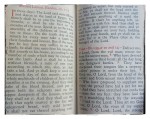IF YOU HAVEN’T BEEN TO CONFESSION FOR A WHILE, OR ENGLISH IS NOT YOUR FIRST LANGUAGE – HERE ARE THE WORDS TO USE:
To help those of you who have not been to confession for a long time, or those of you who do not have English as your first language, here is a form of words to use when going to confession.
PRIEST AND PARISHIONER: In the name of the Father, and of the Son, and of the Holy Spirit. Amen.
PARISHIONER: Bless me, Father, for I have sinned. My last confession was (?time) ago and these are my sins…. For these and all the sins I cannot now remember I am truly sorry.
The PRIEST will now say a few words of encouragement to help you in the Christian life. The PRIEST will also give you a simple PENANCE for you to do afterwards, which may be one of our well known prayers.
The PRIEST will say the words of ABSOLUTION and you will be invited to say your Act of Contrition (prayer of sorrow) as follows:
PARISHIONER: O my God, because You are so good, I am very sorry that I have sinned against You, and by the help of Your grace I will not sin again.
The PRIEST will say a few words to end the ceremony and then you respond:
PARISHIONER: Thank you, Father.
The PARISHIONER leaves and does the PENANCE.
(From a St Saviour’s newsletter)








